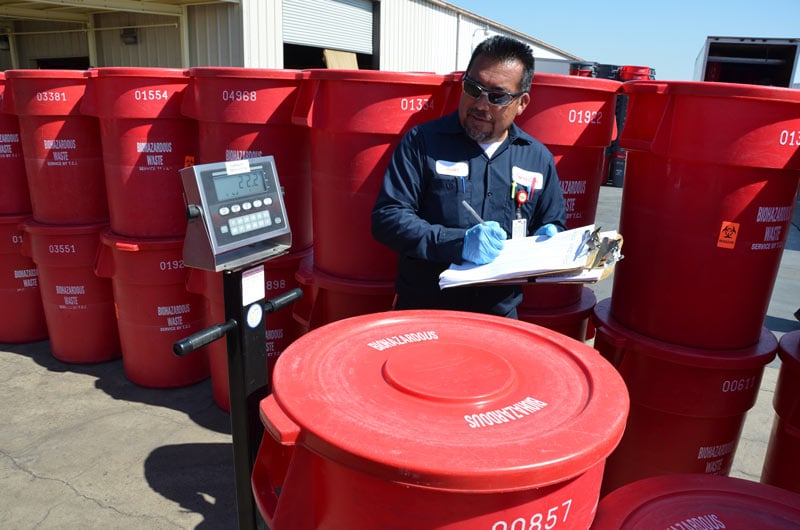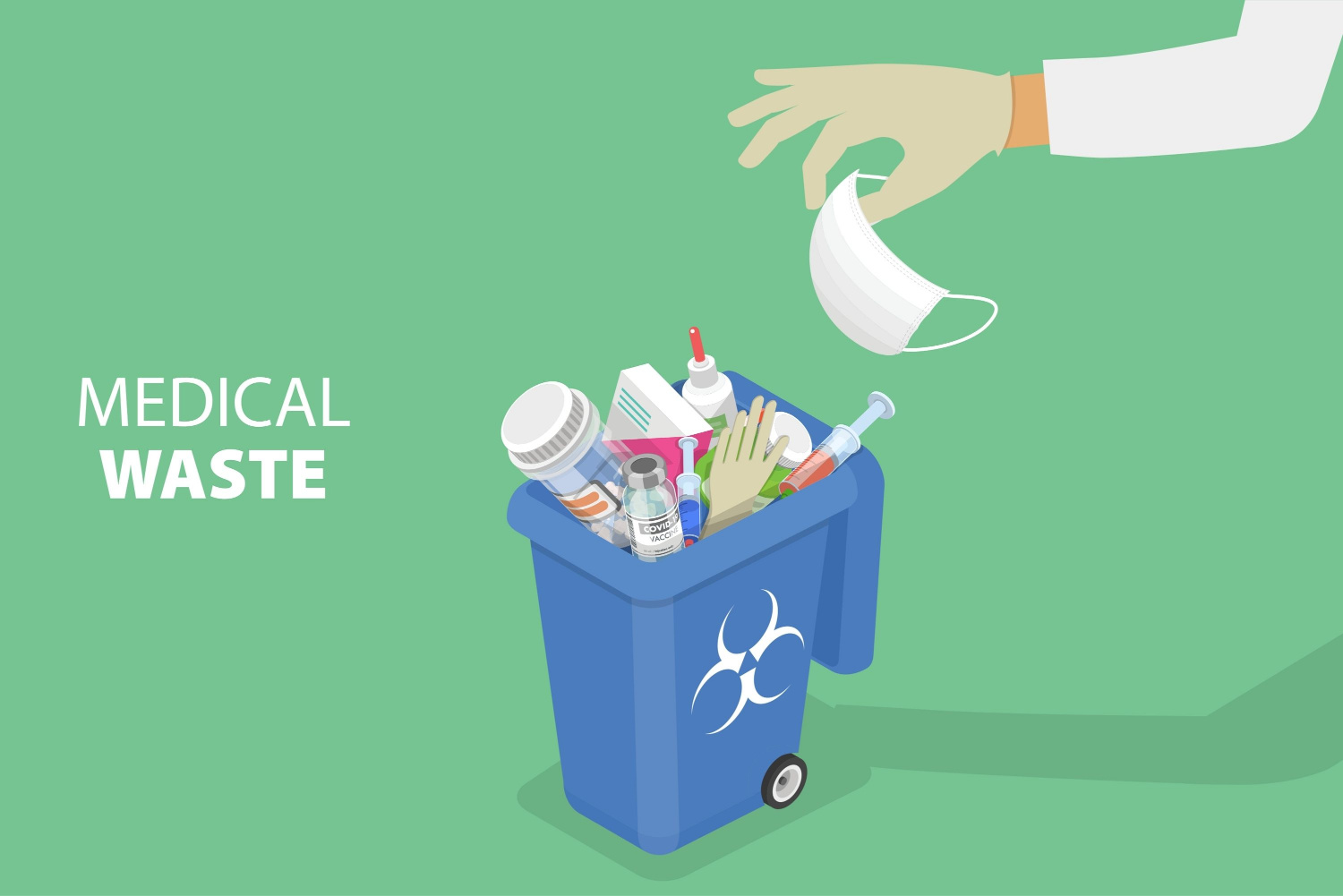Guaranteeing Safe Handling and Disposal of Medical Waste
Ensuring risk-free handling and disposal of medical waste is of extremely important significance in health care settings. Improper management of medical waste can present substantial risks to the environment, public health and wellness, and medical care employees. This requires adherence to rigorous standards and protocols for its safe handling and disposal. In this introduction, we will certainly discover the importance of proper medical waste monitoring, the risks related to incorrect handling and disposal, in addition to the standards and strategies that can be carried out to guarantee its safe disposal. Additionally, we will review the significance of training and education for medical care specialists in order to keep a tidy and secure medical care atmosphere. By following these methods, we can successfully reduce the prospective risks related to clinical waste.
Value of Appropriate Medical Waste Monitoring
Appropriate medical waste management is of utmost value in making sure the safety and security and wellness of healthcare professionals, people, and the public. Medical waste describes any waste created by medical care facilities during the diagnosis, therapy, or immunization of pets or people. This waste can present major wellness dangers otherwise managed and dealt with appropriately.
One of the main factors why correct medical waste administration is important is to avoid the spread of infectious illness. Clinical waste, such as used needles, infected dressings, and biological products, can carry damaging microorganisms. Otherwise taken care of and disposed of properly, these pathogens can be transferred to healthcare workers, people, waste trainers, and even the public, leading to the possible break out of diseases.
Furthermore, correct medical waste administration aids secure the setting - medical waste removal service. Medical waste includes harmful products, consisting of chemicals, pharmaceuticals, and radioactive materials. When not handled appropriately, these compounds can contaminate dirt, water bodies, and the air, presenting a considerable danger to ecological communities and public health and wellness
Furthermore, reliable clinical waste monitoring guarantees compliance with neighborhood regulations and global standards. Governments and regulative bodies have established guidelines and protocols to make certain the safe handling, storage space, transport, and disposal of clinical waste. Complying with these policies is essential to stay clear of legal repercussions and keep the reputation and reliability of medical care facilities.
Threats of Improper Handling and Disposal

Patients can likewise be revealed to these transmittable conditions if clinical waste is not appropriately disposed of. For example, if infected needles or various other sharps are not thrown away in designated puncture-proof containers, they might mistakenly puncture patients, resulting in possible infections. If medical waste is not segregated correctly, there is a threat of cross-contamination in between different types of waste, more enhancing the possibilities of condition transmission.
Improper disposal of clinical waste can likewise have destructive effects on the environment and the basic public. If medical waste is not treated and disposed of correctly, it can contaminate water sources, soil, and air, leading to the spread of illness and contaminants. This can have lasting effects on communities and public health and wellness.
Guidelines for Safe Handling of Medical Waste
Executing effective procedures for the secure handling of medical waste is crucial in making certain the protection of medical care specialists, people, and the public. These guidelines are vital in decreasing the risks associated with the handling and disposal of clinical waste, such as infections, injuries, and environmental contamination.
Most importantly, health care centers should establish a thorough waste monitoring plan that adheres to regional, national, and global regulations. This plan must consist of clear directions on waste segregation, packaging, transportation, storage, and labeling. It is vital to separate different kinds of waste, such as sharps, transmittable materials, pharmaceuticals, and non-hazardous waste, to stop cross-contamination and promote safe disposal.
Furthermore, health care employees have to receive comprehensive training on correct waste handling methods. They ought to be educated on the possible threats of medical waste, the appropriate use individual protective devices (PPE), and the right procedures for handling, transporting, and throwing away various sorts of waste.
Additionally, health care centers ought to regularly keep track of and examine their waste management methods to make certain compliance with guidelines. This includes carrying out normal assessments, reviewing waste handling procedures, and providing responses and training to team member.
Efficient Methods for Waste Disposal
To guarantee the safe handling and disposal of medical waste, it is necessary to employ reliable techniques for garbage disposal. Clinical waste can present considerable threats to public health and the atmosphere otherwise taken care of and dealt with appropriately. Healthcare centers and waste management organizations must carry out appropriate methods to mitigate these risks.
One reliable approach for waste disposal is partition. It includes separating various sorts of medical waste based upon their features. Partition permits for the proper treatment and disposal of each waste classification, minimizing the potential for contamination or harm. Medical care facilities should provide clear standards and training to team member on how to set apart waste correctly.

In addition, medical care facilities need to collaborate with qualified waste management companies to make certain proper disposal of clinical waste. These business have the proficiency and devices called for to securely get rid of and take care of of clinical waste in conformity with guidelines and ideal techniques.
Training and Education for Healthcare Professionals
Health care specialists play an important duty in guaranteeing the secure handling and disposal of clinical waste through extensive training and education. It is crucial for healthcare providers to have a deep understanding of the possible risks related to clinical waste and the appropriate procedures for its monitoring. By receiving appropriate training, medical care experts can minimize the potential transmission of contagious conditions, protect against ecological contamination, and protect both themselves and the public.

In addition, training programs should highlight the use of personal protective devices (PPE) and proper hand health practices when taking care of medical waste. medical waste disposal service. Medical care specialists should understand exactly how to appropriately use and get rid of of PPE to secure themselves from prospective direct exposure to harmful materials. They need to also be educated on the value of regular handwashing and the correct use of hand sanitizers to minimize the spread of contagious diseases
Continuing education and regular updates on clinical waste management methods are crucial for health care specialists. As guidelines and laws advance, it is important to maintain doctor educated concerning any kind of modifications in procedures and ideal practices. This will certainly make certain that they remain current and keep a high standard of safety in dealing with and disposing of medical waste.
Verdict
Finally, correct handling and disposal of clinical waste is important to make sure the safety and security of medical care professionals, patients, and the atmosphere. Disregarding to comply with policies and standards can cause numerous dangers and risks. Implementing efficient strategies for garbage disposal and supplying proper training and education and learning for medical care specialists are crucial in preserving a safe medical care atmosphere. By sticking to these methods, we can reduce the possible dangers connected with medical waste.
Clinical waste refers to any type of waste generated by healthcare centers throughout the medical diagnosis, treatment, or booster shot of human beings or pets. If medical waste is not segregated correctly, there is a risk of cross-contamination in between different kinds of waste, additional enhancing the possibilities of condition transmission.
It is crucial to divide various kinds of waste, such as sharps, transmittable materials, pharmaceuticals, and non-hazardous waste, to protect against cross-contamination and promote safe disposal. WasteX Medical Waste Disposal.
To guarantee the risk-free handling and disposal of medical waste, it is necessary to employ reliable strategies for waste disposal. Furthermore, healthcare centers should develop a normal waste collection and transport routine to avoid waste accumulation and reduce the investigate this site risk of accidents or contamination.